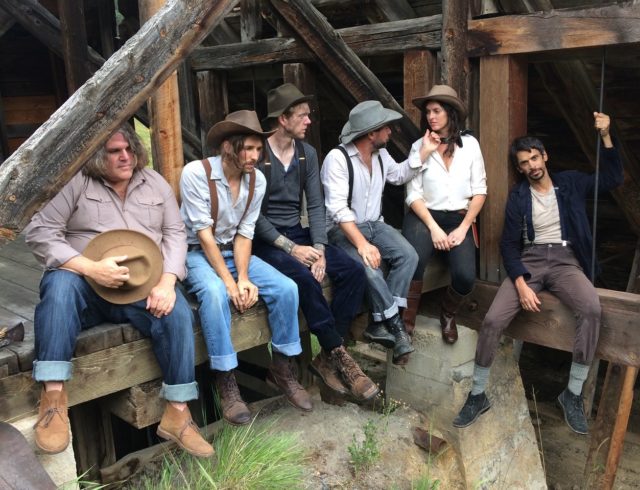
The Gasoline Lollipops are notoriously difficult to categorize; swimming somewhere between folk, alt-country and punk, the band has taken to shrugging their shoulders as if to say, “All three?”
While their sound may confound musical taxonomists, there’s something about it that’s undeniably of the canon of which the band purports to be a part — that of John Prine, Townes Van Zandt, Steve Earle and Leonard Cohen. Each of these artists boast a distinct and recognizable sound while sharing the odd combination of irreverence paired with sensitivity — a partnership of qualities that has come to define the catchall genre of Americana to which the Gasoline Lollipops belong.
Like many Americana artists, the Gasoline Lollipops have become synonymous with a place or region. In their case it is their hometown of Boulder. But after seven years of in-state incubation, the band is brimming with potential to have broader relevance.
They spent November touring Europe, confronting their American identity overtly at every stop along the way. Front man Clay Rose says it didn’t take long before they learned to open every show with a declaratory “Fuck Trump,” a signal of trustworthiness that translated across the Atlantic, no matter the language in which the band’s bills were printed.
In hindsight, Rose wasn’t struck with reflections on what it meant to be an Americana band while in Europe, rather the opposite. By playing new markets he realized “people are people wherever you go.” Maybe it’s the definition of Americana that needs to adjust to a newfound global relevance.
Defined by the Americana Music Association, Americana is “a type of music that incorporates elements of various, mostly acoustic American roots music styles … resulting in a distinctive roots-oriented sound that lives in a world apart from the pure forms of the genres upon which it may draw.”
Rose puts it a lot more simply: “It’s music for the working class.”
From a poli-sci perspective, the working class has never been less defined. Once an easily understood “blue-collar” demographic, now in the face of an increasing wealth gap and modernized work-force, it’s a loose and clumsy descriptor, vaguely of the lower class. Leave it up to the artists to reveal its more hidden ethos.
Synchronistically, the Gasoline Lollipops are rising to the call, issuing their first (doggedly) self-produced album and vinyl release, Soul Mine, on Dec. 15. It’s a mature and complex record, side A full of rockers and side B full of ballads — an uncharted step for the band into the high and low emotions of today’s working class, gleaned straight from the ripe and empathetic inner world of Clay Rose.
Just like the Gasoline Lollipops have always been a hardworking band, Rose has always been an “open book,” the intimacies of his past and present laid bare for the world to see. Where once his story was dominated by anecdotes of his rough and tumble past, for the last two years it’s been dominated by his newfound sobriety and all it’s birthed.
“This way of life is still new to me,” Rose says. “It’s sort of like every step I take in this direction is a step of faith, the path continuously appearing right underneath my feet. But sometimes it takes right up to the last second to appear and so I always have this feeling of falling, but actually I’m walking and getting stronger at it everyday.”
Although drawing from the unique details of his life, Rose is describing the terrible fear that lies on the edge for all of the world’s modestly employed — of financial insecurity, addictions and less-than-fabled pasts. It’s the hard and mysterious work of yielding to uncertain circumstances, knowing full well the road is paved with personal demons and that an honest effort is never quite enough.
Rose describes it as the important work of being honest, which in this time of untethered, opinion-rampant identity politics is no small task. But he’s been brave and barebones on all fronts in offering up what his journey through sobriety has entailed. Still, it’s been hard for the musician to read about his private struggles in print; moving forward he’s rethinking his open approach, though he believes it plays an important part in the cathartic experience the band offers, saying: “Not only has it been valuable [for me to listen to honest musicians, specifically Leonard Cohen], but it’s saved my life at times, to know that someone else has known what I go through, knows the way I feel.”
Publicly disclosing his demons these past few years has seemed to make them feel more real, his dedication to sobriety more worthy. But there’s a part of him that will always be sacredly private, specifically his process of songwriting.
“I never collaborate on the lyrics,” he says. “I don’t show it to anybody until it is done. I feel like when write it down it’s unchangeable and finite somehow, but when it’s just in my head the words all exist in the ether and I can move them around.”
No matter what else is going on, he says, this makes his songwriting feel free, and freedom is precisely what the working class seems to be clamoring for.
On the Bill: Gasoline Lollipops — With Foxfeather, Bella Duro. Doors: 8:30 p.m. Fox Theatre. 1135 13th St., Boulder.














